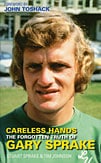 The Forgotten Truth of Gary Sprake
The Forgotten Truth of Gary Sprake
by Stuart Sprake & Tim Johnson
Tempus, £9.99
Reviewed by Huw Richards
From WSC 248 October 2007
Some decent sporting careers are damned by a single error. Bill Buckner, a just-this-side-of-great baseball player, has for 21 years been defined by the fielding error that extended the Boston Red Sox’s interminable wait to win a World Series. Gordon Smith will have to make one heck of a splash running the Scottish FA to efface memories of his miss in the 1983 FA Cup final. Such judgments are often undeserved, however, and the authors here aim to prove that Gary Sprake, Stuart’s uncle, merited better.
Admittedly the former Leeds keeper’s indictment is lengthier, extending through the joyous piece of slapstick in front of the Kop in 1967 that gives the book its title, a calamitous dive over Peter Houseman’s shot in the 1970 FA Cup final and – far more important in the eyes of many erstwhile team-mates – involvement in the Daily Mirror bribery allegations against Don Revie.
You have to say they prove their case. The problem is that ponderous writing, exhaustive citation of yellowing match reports and endless reiteration of their thesis that he was one of the best keepers of his time leaves the reader pleading “OK, I admit it, he was good, would you please now give over?”, rather than enthused. That Revie, whose dedication to football realpolitik might have struck Machiavelli as excessive, picked him for a decade would seem evidence enough.
They also make a decent case that Revie’s achievement in turning a club of negligible prior achievement into giants through a cast largely composed of misfits and discards – Sprake, undriven to the point of preferring rugby, his talents unwanted by Swansea Schools and Swansea Town, was typical – matches any in British football history.
And in an authorised biography, there is honesty in a not wholly attractive off-field portrayal of Sprake – a shagger and boozer prone to lash out, although the reminder that he once chinned Bobby Gould on the pitch at Highbury will do no harm to his popularity in Wales.
He follows his compatriot Terry Yorath in proclaiming his affection and admiration for Revie, but damning him with copious praise. Revie emerges as paranoid, deceitful – betraying a promise to give Sprake a testimonial – and bent. The Mirror’s findings are given considerable credence, with a reminder to those of us for whom Sunderland’s defeat of Leeds in the 1973 FA Cup final remains a shining memory that one reason for manager Bob Stokoe’s ecstasy was that Revie had openly tried to subvert his Bury team in 1962. The Leeds team-mates who have blanked and blackguarded Sprake appear as charmless off the field as on it.
Those who question that characterisation should check out the paragraph (pp228‑9) in which Sprake talks of Leeds practising foul play and gamesmanship, feigning injury (without a foreign player in sight) and taking the ball into the corner to waste time.
The trouble with any version of Revie’s Leeds United is that nowadays we see them through the prism not only of memory, but of a fictionalised Brian Clough’s stream of consciousness in David Peace’s extraordinary novel The Damned Utd. And just because Peace’s Cloughie is solipsistic and paranoid it doesn’t mean he wasn’t right – they were indeed dirty, cheating bastards.